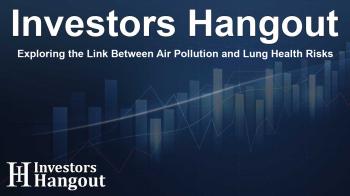Exploring the Link Between Air Pollution and Lung Health Risks

Understanding the Impact of Air Pollution on Health
Long-term exposure to particulate matter (PM) poses a significant risk to human health, particularly affecting lung function and immune balance. Research conducted by a dedicated team at Pusan National University uncovers critical insights into how pollutants like PM2.5 and PM10 influence lung health. This study emphasizes the importance of understanding environmental impacts on our well-being.
Key Findings from Recent Research
A team led by Professor Changwan Hong has revealed alarming connections between air pollution and immune responses in the lungs of mice. The study exposed these animals to particulate matter over an extended period, providing them with a comprehensive view of how such exposure can influence lung inflammation and immune regulation. The researchers discovered that prolonged exposure activated oxidative stress and the NRF2 pathway, signaling an increase in allergic-type immune responses.
Mechanisms of Lung Damage
During their investigation, the research team found that mice subjected to PM exposure exhibited notable signs of lung damage, including inflammation and structural changes in lung tissue. The findings indicated that immune responses shifted notably from protective TH1 signals to a more damaging TH2 type, associated with asthma and allergic reactions. Elevated cytokines like IL-4, IL-5, and IL-13 were observed, indicating an alarming shift in immune regulation.
The Role of NRF2 in Immune Regulation
NRF2 is typically recognized for its protective functions against environmental stressors. Still, in the context of chronic pollution exposure, this pathway appears to play a dual role that might exacerbate immune dysregulation. Professor Hong noted that while NRF2 usually defends against oxidative stress, its sustained activation linked to air pollution aggravated allergic inflammation responses. This groundbreaking understanding could reshape strategies for assessing air quality impacts on health.
Implications for Chronic Respiratory Issues
The ripple effects of these findings are vast, extending beyond basic research into public health implications. Chronic exposure to harmful pollutants not only has immediate effects but also suggests long-term risks for increasing asthma rates and other respiratory diseases. There is a clear indication that modulating NRF2 signaling or targeting oxidative stress could provide avenues for new therapeutic interventions aimed at mitigating pollution-induced lung damage.
The Importance of Addressing Air Quality
Given that over 90% of the global population inhales air that does not meet safety guidelines established by health organizations, these insights underscore the critical need for stringent air quality regulations. Protecting vulnerable populations is paramount, as those with preexisting health conditions may face heightened risks due to air pollution.
This study not only serves as a call to action regarding air quality improvements but also advocates for ongoing research efforts to explore molecular targets for therapeutic developments, thereby enhancing public health outcomes linked to environmental quality.
Frequently Asked Questions
What did the study by Pusan National University find?
The study found that long-term exposure to particulate matter leads to immune responses that favor allergic inflammation and worsen lung health.
What are the key pollutants discussed in the research?
The key pollutants referenced are PM2.5 and PM10, which are fine and coarse particulate matter harmful to lung function.
How does NRF2 relate to pollution's effects on health?
NRF2 is involved in protecting against oxidative stress, but chronic activation due to pollution can exacerbate inflammation in the lungs.
Why is air quality important for public health?
Poor air quality can lead to respiratory diseases and severe health issues, impacting vulnerable populations the most.
What can be done to improve air quality?
Implementing stricter regulations on emissions and promoting practices that reduce pollution can significantly improve air quality and health outcomes.
About The Author
Contact Hannah Lewis privately here. Or send an email with ATTN: Hannah Lewis as the subject to contact@investorshangout.com.
About Investors Hangout
Investors Hangout is a leading online stock forum for financial discussion and learning, offering a wide range of free tools and resources. It draws in traders of all levels, who exchange market knowledge, investigate trading tactics, and keep an eye on industry developments in real time. Featuring financial articles, stock message boards, quotes, charts, company profiles, and live news updates. Through cooperative learning and a wealth of informational resources, it helps users from novices creating their first portfolios to experts honing their techniques. Join Investors Hangout today: https://investorshangout.com/
The content of this article is based on factual, publicly available information and does not represent legal, financial, or investment advice. Investors Hangout does not offer financial advice, and the author is not a licensed financial advisor. Consult a qualified advisor before making any financial or investment decisions based on this article. This article should not be considered advice to purchase, sell, or hold any securities or other investments. If any of the material provided here is inaccurate, please contact us for corrections.

